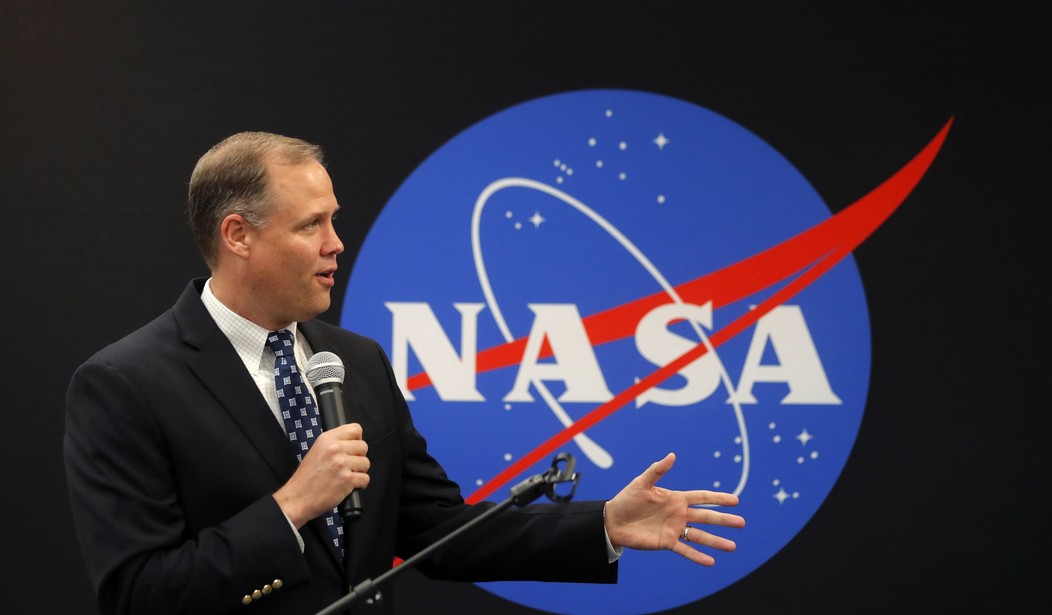Commercial spaceflight is taking off as the next step in our journey toward the planets and the stars, but we still need NASA to lead and to bridge the transitions ahead. We also need it to keep our free republic ahead of our non-free competitors here on Earth. Space is the strategic and technological high ground and will be for the foreseeable future.
NASA Administrator James Bridenstine went to the Russell Senate building on Wednesday for a Senate Appropriations hearing with one mission — to advocate for full funding for the space agency’s ambitious priority of a 2024 Moon landing.
Bridenstine’s message to Congress is clear: NASA needs more money if America’s to land on the Moon and keep its place as the leader in space exploration. Foreign adversaries are challenging America’s leadership in space, and a full commitment from Congress is necessary to ensure we beat these enemies’ ambitious mission goals and ultimately receive a return on the billions we invest in space and cutting-edge aeronautics.
While the House was able to pass appropriations in July, it fell billions of dollars short of what NASA says is necessary to achieve the fast-tracked Artemis Moon landing. This has left Bridenstine focused on securing more funding in the Senate with the hopes of a reconciliation bill coming through before Christmas.
For the sake of the project, let’s hope it does.
Put forward in late 2019, the Senate’s NASA Authorization Act (NAA) is a product of the accelerated space goals laid out under the Trump administration. Expedited timelines and new commercial partners highlight what has been a rebirth of sorts for America’s focus on space exploration.
From the Senate point of view, tough questions must be asked in terms of funding priorities. The nation is, after all, in the middle of a historic economic recovery. But the cost of underfunding could mean missed U.S. deadlines, which would ultimately empower our antagonists and increase the chances of canceled missions from which no return on investment can be secured.
In the hearing, Bridenstine explicitly called out China as the greatest non-funding threat to NASA’s success, pointing out that they are directly competing with the U.S. on many of their space goals and could undermine our space program if they achieve their goals first.
China is building its own space station (and its western TV network, CGTN, brags about it) and is actively courting our partners for investments. It wants to land on the Moon before America’s return there so it can claim its valuable resources and ensure that it’s the first to Mars. As if that’s not enough, it also wants to control low earth orbit for satellites and security purposes. Low earth orbit is where most satellites, commercial and scientific, live. Both the International Space Station and the Hubble Space Telescope are low earth orbit spacecraft. The United States cannot allow communist China to control this vital slice of space.
Thankfully, Congress shares Bridenstine’s concerns over China. In the NAA, Senator Cory Gardner (R-CO) proposed background check amendments to police possible connections between NASA vendors and firms connected to the Chinese government.
In the last five years, the U.S. has seen a spike in Chinese espionage against its space and defense industry, including a Thousand Talents Plan-related case connected to NASA itself. Hackers and agents alike have navigated the American security wall and attempted to steal and disrupt our current innovations and projects. Before a new appropriations bill is passed, it’s important for vendors to be screened to prevent penetration from intrusive Chinese sources.
But to address that same concern, it’s critical that Congress provides NASA with adequate funding levels so that America can beat China to operationalizing space.
Congress has backed itself into a corner by pushing many of the appropriating issues this late into the year – a chaotic election year no less. NASA plans to move forward with Artemis contract selection in February and desperately needs funding to ensure it stays on schedule.
Nevertheless, Congress must get itself out of the corner, and fast — because unlike America, China doesn’t have legislative log jams slowing down their project timelines. With China hot on their tail to reach the Moon, the clock is ticking for the U.S. to get moving.
The health and security of these programs are critical to the economy and output of the entire nation. Allowing further delays would be dangerous for not only our security but also our economy.
Members on both sides of the aisle have spoken about the urgency with which action must be taken. That’s encouraging; however, Congress ultimately needs to put election-year partisanship to the side and work to get a smart, secure NAA passed.
If not, the problem won’t be with Houston; it will be in D.C.
Bryan Preston is the author of Hubble’s Revelations: The Amazing Time Machine and Its Most Important Discoveries. He’s a former producer for NASA’s Hubble Space Telescope. His documentary, Hubble Reborn, plays in museums and space centers worldwide including The National Air & Space Museum in Washington, DC.
Is There a Sign of Life On Venus? ‘Maybe’ Is Better Than a Hard ‘No’









Join the conversation as a VIP Member